Star Trek Warned Us, #1: Paradise
The 1994 Deep Space Nine episode is a nuanced, sophisticated look at cult dynamics unlike anything else in Star Trek
“Alixus doesn't believe in doors. We all take it for granted now. You'll get used to it.”
When Sisko and O’Brien stumble across a human colony of crash survivors who’ve apparently thrived in isolation on an uncharted world without any technology for 10 years - abandoning their 24th-century equipment to live an agrarian lifestyle in harmony with nature - it isn’t long before they discover that life in the “community” is far from as bucolic as it appears on the surface.
Combine “natural healing” eco-zealotry and Amish-style Luddism with a pinch of woke righteousness and a whole handful of the Khmer Rouge, and you get this episode. As one YouTuber described it: “Starfleet gets its own version of the CHAZ. With about the results you’d expect.”
The episode’s villain - the colony’s self-appointed leader Alixus - is a frighteningly realistic figure. Dolores Umbridge meets Greta Thunberg, she looks like she should be running a health food store or weekend yoga retreat. The script describes her as “a handsome, happy-eyed, smiling, glowingly charismatic woman, about fifty.” The other colonists are perfectly ordinary, and the way in which they fall in line behind her is all too believable. There are no aliens, gods, cyborgs, mystical beings or all-powerful computers to blame for anything that happens here. All the harm in this episode is done by humans: their conformity and cowardice, their susceptibility to psychological manipulation, their inchoate desire for authoritarianism.
“Look at you. Still wearing your uniform. Wanting so badly to get back to your station with its artificial gravity and its sterilized air. You are so disconnected from your core identity, Ben.”
Alixus is the worst kind of narcissistic, manipulative holier-than-thou abuser, as the smart script and Gail Strickland’s performance make evidently clear - an adept brainwasher who's prepared to abduct and kill in the name of the ‘common good’ and the ‘community’, but really it's all just about her power. What she shares with a number of other iconic female villains (including Deep Space Nine’s own Winn Adami, played by Louise Fletcher) is that she never uses direct aggression to achieve her aims, instead passive-aggression, control and manipulation, all beneath a beneficent layer of plausible deniability. This is pretty close to how the most evil cult leaders, groomers and abusers operate in reality. Alixus is a true sociopath and psychopath; everyone else's wellbeing is totally collateral to her, and she's only interested in other people insofar as they prop up her power and serve her delusion. In a really great piece of writing, the only way she even seems able to experience or conceptualize others’ suffering is in narcissistic ways that put the focus back on herself. When Sisko confronts Alixus with her responsibility for several colonists’ preventable deaths, she replies “Only my son knows how I have suffered”. It's the ‘this will hurt me more than it will hurt you’ school of thinking; everything is about psychological control.
Abusers in group situations requires an enabler, and here Joseph fulfils that function, though his characterisation is inconsistent. While he shows signs of resistance and rebellion in parts of the episode, the Joseph we see at the end is subservient to Alixus and unwilling to stand up to her even once the full truth of her role in the colony’s predicament has been revealed; worse, he repeats Alixus’s dogma and speaks for the entire group in her place when Sisko removes her from the planet to answer for her crimes, segueing into the leadership role in her absence.
The battle of wills between Alixus and Sisko is riveting, and Avery Brooks's performance is outstanding, full of dignity, unbroken spirit and burning passion - the fact that the two Starfleet officers whom Alixus has abducted, tortured and made work in the fields are an African-American and an Irishman isn't lost on present-day audiences. Sisko’s uniform becomes a symbolic issue of control and the object of a power game due to its representative value and the message Alixus knows it would send to the rest of the group; she knows the Starfleet presence is a threat to her rule as it stands for the possibility of an outside world and an alternative authority and way of doing things. Crushing Sisko's will and assimilating him into the group would crush any lingering thoughts of freedom among the others. The wordless scene where Sisko chooses to return to the punishment box rather than live in Alixus’s community is incredibly powerful. O'Brien follows this by taking decisive action to shatter the status quo and get himself, Sisko and hopefully the rest of the colonists out of there.
The ending is overly swift and has issues that are more to do with the direction and score than the script. What’s most notable of all is the lack of outrage from the colonists when they discover that Alixus stranded them here deliberately and is generating the energy field that prevents the use of any modern technology - so all the deaths, suffering and isolation of the past decade were completely preventable. But as Star Trek forum user Justin comments: “Anyone who doesn't understand why the colonists acted the way they did has never seen a cult at work. These people have been brainwashed by their leader for 10 years, and brutally punished for crimes of individuality or opposition [...]. When the truth is revealed to them, of course they choose to ignore what it means. It breaks the worldview that's been hammered into them every day for a decade. The only ones capable of rational, objective thought are the ones who have yet to be fully indoctrinated: the two children we see solemnly staring at the cage at the end of the final scene.”
It’s infuriating, anti-cathartic and reveals deeper truths about how a cult can outlast its leader. Take away the figurehead, and someone else will opportunistically assume the leadership role right away. And the membership will go along with it, because they’ve been mentally broken - punished time and again for the slightest sign of non-compliance or independent initiative, all for their own good - and can’t imagine any other kind of life anymore: you can’t undo a decade of programming in a few weeks.
The B-plot of Dax and Kira attempting to track down and rescue Sisko and O’Brien may seem less dramatically compelling by comparison, but it works as a strong contrast: these are two independent, professional women who do have real power but who use it responsibly by working together to help others, out of a true selfless sense of community. The manoeuvre Dax performs to pull the runabout out of warp risks both her and Kira's lives, yet they're both prepared to do this because they trust and respect each other and because of their responsibility to Sisko and O'Brien, important members of their community. This genuine selflessness and collegial communal spirit stands in total contrast to Alixus’s entirely self-serving and hollow instrumentalisation of ‘community’ as a tool of power; she's prepared to sacrifice anyone, even her son, to her ideals, but never herself.
I love this episode because it comes close to how evil actually operates in the real world. Abusers don’t just groom their individual victims, they groom the entire social environment around them to think of them as a pillar of society, someone beyond reproach who couldn’t possibly have done that. It's a thoughtful script with no easy endings that gives the audience all the evidence they need to understand the depths of Alixus’s evil, yet without being didactic.

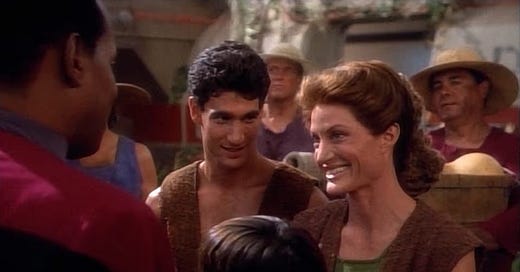



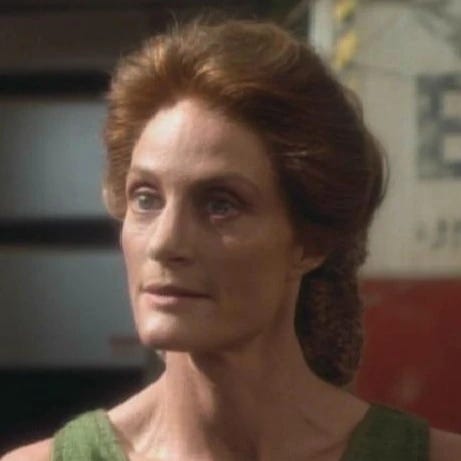
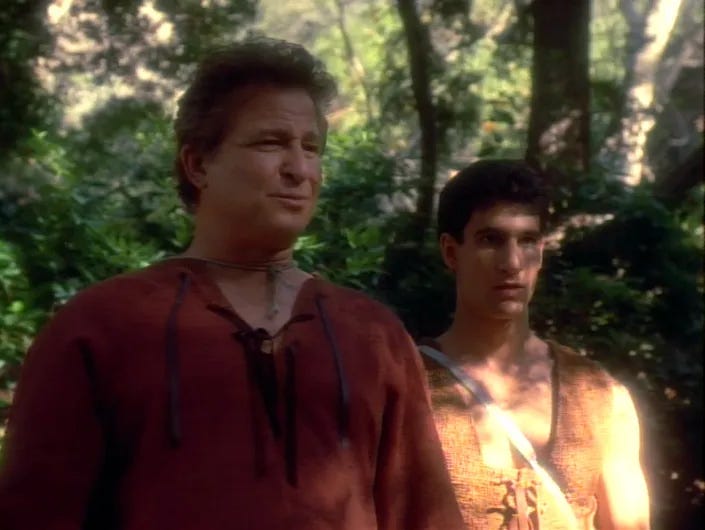
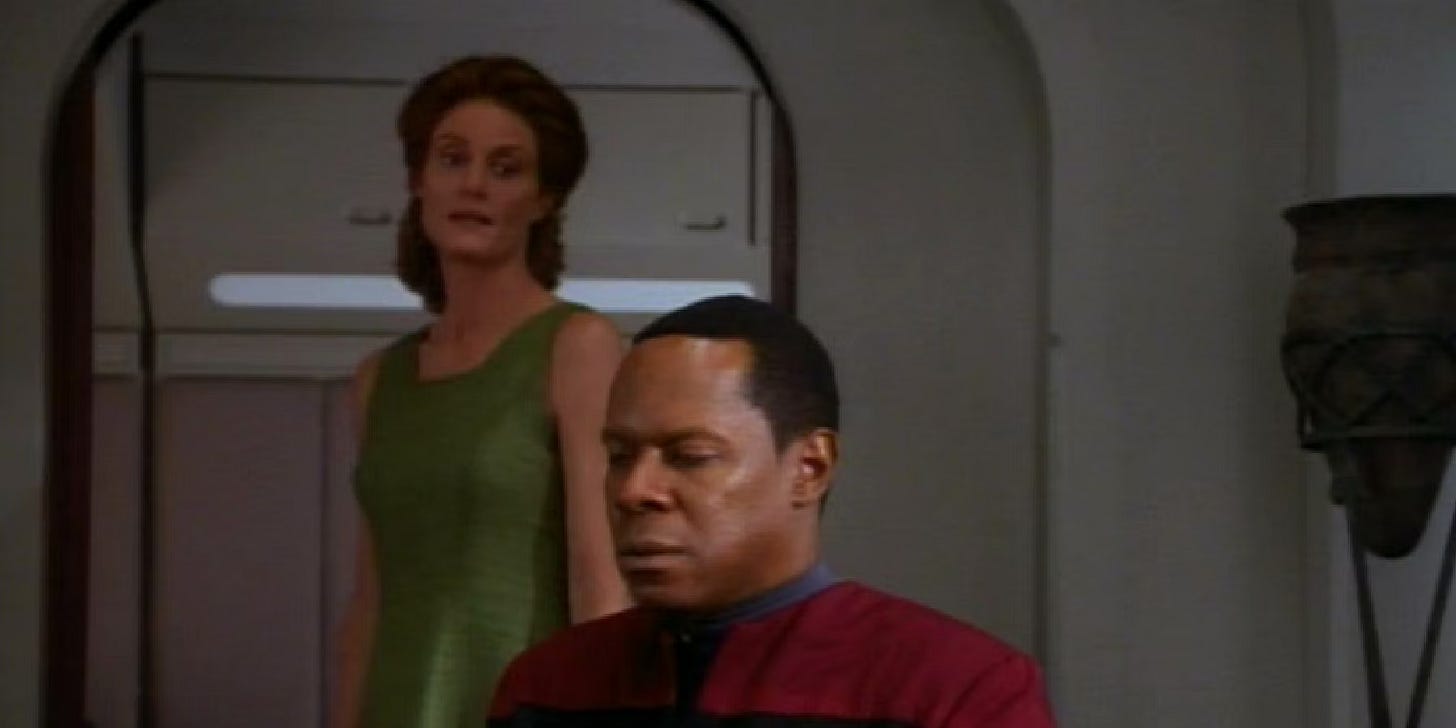
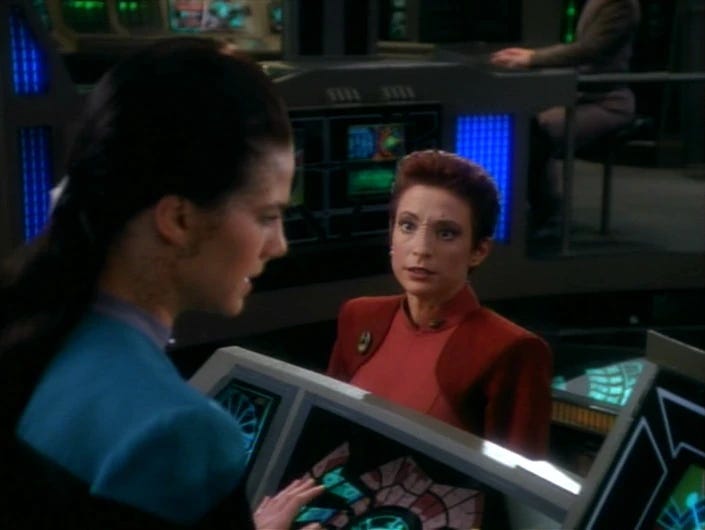
Yes
This is why English literature (or its equivalent) should still be a requirement. You have just demonstrated, supremely, that analysing a text or, in our age, any narrative, can yield worth. I never liked this episode when I watched it as a kid - I found it more boring than others. I liked explosions and you know, phasers and stuff. I watched it the other day on Netflix (U.K.) and found more there than I realised.
How much more is out there? Good science fiction does this; perhaps the distance from reality allows a more subtle reflection. In my youth I mostly watched it for the explosions.. and stuff. Maybe as the complete lack of writing talent in our era becomes more obvious we will all start to analyse why the preceding generation were able to cram so many ideas into 42 minutes!
I’m pretty sure it’s because they read English literature.